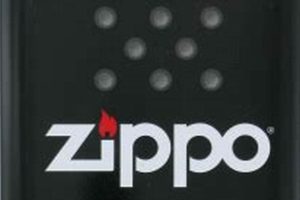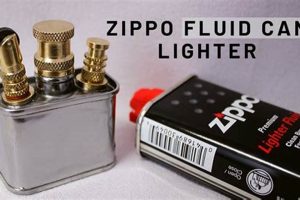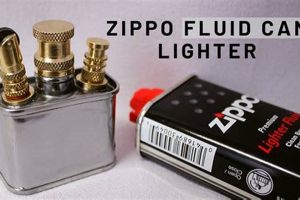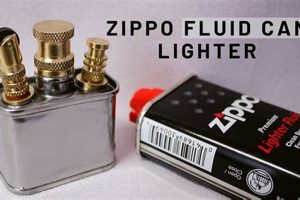Using charcoal lighter fluid in a Zippo-style lighter is strongly discouraged. These lighters are designed for a specific type of refined petroleum distillate, typically referred to as lighter fluid. Charcoal lighter fluid, formulated for starting charcoal grills, contains different chemical compounds and often has a much higher viscosity. This can lead to a variety of problems, including clogging the wick, producing excessive soot, and potentially damaging the lighter’s internal mechanisms.
The correct fuel ensures consistent, clean burning and prolongs the life of the lighter. Using the appropriate fuel is a key aspect of maintaining these reusable lighters, which have a history dating back to the 1930s. Their enduring popularity stems from their reliable design and refillable nature, making fuel choice an important consideration for their continued function.
This difference in fuels raises several important topics for discussion: the specific properties of each type of fluid, the potential risks associated with using the wrong fuel, proper maintenance procedures for Zippo-style lighters, and recommended fuel alternatives for various situations.
Tips for Fueling a Zippo-Style Lighter
Maintaining a Zippo-style lighter requires using the correct fuel. These tips offer guidance on proper fueling practices and highlight the importance of avoiding inappropriate fuels.
Tip 1: Use only Zippo premium lighter fluid or other refined butane fuel. This specialized fluid is formulated for optimal performance and prevents damage to the lighter’s components.
Tip 2: Avoid charcoal lighter fluid. Its different chemical composition and higher viscosity can clog the wick and produce excessive soot.
Tip 3: Refill the lighter in a well-ventilated area, away from open flames. This minimizes the risk of accidental ignition.
Tip 4: Do not overfill. Stop filling when the absorbent material is saturated. Overfilling can lead to leaks and fuel waste.
Tip 5: Wipe away any excess fuel. This prevents accidental ignition and keeps the lighter clean.
Tip 6: Allow the lighter to sit for a few minutes after refueling. This allows the fuel to properly absorb into the wick.
Tip 7: Store lighter fluid safely, away from heat sources and out of reach of children. Proper storage prevents accidents and maintains the fluid’s quality.
Following these guidelines ensures optimal lighter performance, prolongs the lighter’s lifespan, and promotes safe handling practices.
By understanding the importance of using the correct fuel and following proper maintenance procedures, one can appreciate the longevity and reliability of these classic lighters.
1. Fuel Type Incompatibility
Fuel type incompatibility is central to understanding the risks of using BBQ lighter fluid in a Zippo lighter. A Zippo lighter is engineered for a specific type of fuel, and using an incompatible fuel, such as BBQ lighter fluid, can lead to various problems, impacting both functionality and safety.
- Chemical Composition Differences
Zippo premium lighter fluid is a highly refined petroleum distillate, formulated for clean burning and minimal residue. BBQ lighter fluid, on the other hand, often contains heavier hydrocarbons and additives designed for igniting charcoal. These different chemical compositions are not interchangeable. Using BBQ fluid in a Zippo can disrupt the combustion process, leading to inefficient burning and excessive soot buildup.
- Viscosity
Viscosity, the thickness of a fluid, plays a crucial role in how a lighter functions. Zippo fluid’s low viscosity allows it to flow easily through the wicking system. BBQ fluid tends to be more viscous. This higher viscosity can clog the wick, preventing the fuel from reaching the flint and hindering ignition. Continued use of an overly viscous fuel can permanently damage the wick and other internal components.
- Residue and Clogging
The chemical differences between the two fuel types contribute to residue buildup. BBQ lighter fluid produces significantly more soot and residue than Zippo premium fluid. This residue clogs the wick and air inlets, further impeding fuel flow and potentially causing malfunctions. Over time, excessive residue can render the lighter unusable.
- Safety Concerns
Using an incompatible fuel like BBQ lighter fluid in a Zippo can pose safety risks. The improper burning caused by the incorrect fuel can lead to uneven flames, flare-ups, and potentially even small explosions within the lighter casing. Furthermore, the increased residue buildup can create a fire hazard, especially if the lighter is not regularly cleaned.
The incompatibility between BBQ lighter fluid and Zippo lighters stems from fundamental differences in their chemical properties and intended uses. Using the correct fuel is essential for safe and efficient operation, preserving the longevity of the lighter, and mitigating potential risks.
2. Clogging
Clogging is a significant consequence of using BBQ lighter fluid in a Zippo-style lighter. The incompatibility between the fluid’s properties and the lighter’s design leads to blockages within the fuel delivery system, impacting functionality and potentially causing permanent damage.
- Wick Saturation
The wick, a crucial component for fuel delivery, becomes saturated with the thick, viscous BBQ lighter fluid. Unlike Zippo premium fluid, which is designed for efficient absorption and evaporation, BBQ fluid clings to the wick fibers, restricting fuel flow. This saturation inhibits the lighter’s ability to draw fuel upwards, ultimately preventing ignition.
- Residue Buildup
BBQ lighter fluid contains heavier hydrocarbons and additives not found in Zippo premium fluid. These components do not burn cleanly, leaving behind a sticky residue within the lighter’s mechanism. This residue accumulates in the wick and other narrow passages, further exacerbating clogging and disrupting fuel flow. Over time, this buildup can solidify, making the lighter unusable.
- Impact on the Flint Wheel
The flint wheel mechanism, responsible for creating the spark that ignites the fuel, can also be affected by clogging. Residue from the BBQ fluid can accumulate around the flint and striker wheel, hindering their interaction. This can lead to inconsistent sparking or complete failure to ignite.
- Airflow Restriction
Proper airflow is essential for a clean, consistent flame. The residue and thickened fuel associated with using BBQ fluid can restrict airflow within the lighter. This reduced airflow leads to incomplete combustion, producing more soot and further contributing to clogging. The resulting flame may be weak, smoky, or nonexistent.
The clogging caused by using BBQ lighter fluid in a Zippo lighter underscores the importance of using the correct fuel. The incompatibility between the fluid and the lighter’s design leads to a cascade of issues, from wick saturation and residue buildup to impaired sparking and restricted airflow, ultimately compromising the lighters functionality and potentially causing irreversible damage. Therefore, adhering to manufacturer recommendations regarding fuel type is crucial for maintaining the lighter’s performance and longevity.
3. Damage to mechanism
Using BBQ lighter fluid in a Zippo-style lighter can cause significant damage to the intricate internal mechanism. These lighters are precision-engineered for a specific type of fuel, and using an incompatible fluid like BBQ lighter fluid disrupts their intended function, leading to various mechanical problems.
- Wick Deterioration
The wick, designed to absorb and transport fuel, can be damaged by the thick, viscous nature of BBQ lighter fluid. The fluid clogs the wick’s fibers, hindering fuel flow and leading to incomplete combustion. Over time, this can cause the wick to char, fray, or even disintegrate, requiring replacement.
- Flint and Striker Wheel Damage
Residue from BBQ lighter fluid can accumulate on the flint wheel and striker mechanism. This buildup interferes with the creation of sparks necessary for ignition. The residue can also corrode these components, reducing their lifespan and effectiveness.
- Valve and Seal Degradation
The valves and seals within a Zippo lighter are designed to prevent fuel leaks and maintain proper pressure. BBQ lighter fluid can degrade these components due to its chemical composition. This can lead to fuel leakage, reduced performance, and a potential fire hazard.
- Casing Corrosion
While the external casing of a Zippo is typically durable, the internal components can be susceptible to corrosion from the chemical additives present in BBQ lighter fluid. This corrosion can affect the functionality of moving parts and potentially compromise the structural integrity of the lighter’s internal assembly.
The various forms of damage caused by using BBQ lighter fluid in a Zippo lighter highlight the importance of using the correct fuel. The damage extends beyond simple clogging and can lead to costly repairs or even render the lighter unusable. Adhering to manufacturer recommendations regarding fuel type is essential for preserving the lighters functionality and extending its lifespan.
4. Increased Soot Production
Increased soot production is a direct consequence of using BBQ lighter fluid in a Zippo-style lighter. This outcome stems from the inherent incompatibility between the fluid’s properties and the lighter’s design. BBQ lighter fluid contains heavier hydrocarbons and additives not present in Zippo premium fluid. These components do not combust completely, resulting in a significant increase in soot.
The incomplete combustion arises from the higher viscosity of BBQ lighter fluid, which restricts its flow through the wick. This restricted flow leads to a lower fuel-to-air ratio in the flame, hindering complete combustion. The unburnt carbon particles manifest as black soot, accumulating on the lighter’s chimney, wick, and surrounding surfaces. A comparative example can be observed when burning a candle with a restricted air supply the flame becomes smoky and produces more soot. Similarly, using a thicker, less volatile fluid in a Zippo lighter creates a comparable scenario of incomplete combustion and increased soot generation.
The practical significance of understanding this connection lies in recognizing the potential damage and maintenance issues associated with increased soot production. Excessive soot buildup can clog the lighter’s mechanism, hindering its performance and potentially requiring frequent cleaning. Moreover, soot accumulation on the wick reduces its ability to absorb fuel, impacting the lighter’s ability to ignite and maintain a consistent flame. Therefore, choosing the correct fuel for a Zippo lighter is crucial for mitigating soot production and ensuring optimal functionality.
5. Fire Hazard
Using barbecue lighter fluid in a Zippo-style lighter presents a significant fire hazard. This risk stems from the fluid’s chemical properties and its incompatibility with the lighter’s design. Barbecue lighter fluid has a lower flash point than Zippo premium lighter fluid, meaning it ignites at a lower temperature. This increased volatility makes accidental ignition more likely during refueling or if the lighter leaks. Furthermore, the improper burning of barbecue fluid within a Zippo can produce unpredictable flames, potentially leading to flare-ups or small explosions. One example involves a user attempting to refill a Zippo with barbecue fluid near a lit candle. The fluid’s lower flash point could lead to ignition of the fluid vapors, causing a flash fire.
The potential for leaks also contributes to the fire hazard. Barbecue fluid’s viscosity is not optimal for the Zippo’s wick and sealing system. This can result in leaks, exposing the highly flammable fluid to the air and increasing the risk of accidental ignition. Storing a Zippo filled with barbecue fluid also poses a greater risk. Temperature fluctuations can cause the fluid to expand, leading to leaks and potential ignition. Another example includes a lighter stored in a pocket igniting due to friction and leaked barbecue fluid.
Understanding the fire hazards associated with using barbecue lighter fluid in a Zippo underscores the importance of using the correct fuel. Choosing the appropriate fuel significantly reduces the risk of accidental fires and ensures safer operation. Ignoring manufacturer recommendations regarding fuel type increases the potential for dangerous situations and jeopardizes personal safety. Proper fuel selection is a critical aspect of responsible lighter ownership and contributes significantly to fire prevention.
6. Voiding Warranty
Using barbecue lighter fluid in a Zippo-style lighter can void the manufacturer’s warranty. Zippo lighters are designed for a specific type of fuel, and using an incompatible fuel like barbecue fluid is explicitly against manufacturer recommendations. This action is considered misuse and consequently invalidates any warranty coverage. The warranty typically covers defects in materials or workmanship under normal use. Using the wrong fuel introduces variables outside the scope of normal use, leading to potential damage not covered by the warranty. One example involves a malfunctioning hinge after prolonged use of barbecue fluid. While a faulty hinge might be covered under normal circumstances, the use of improper fuel voids this coverage. Repairing or replacing parts damaged by misuse becomes the owner’s responsibility.
The practical significance of voiding the warranty lies in the financial implications. Repairs, especially those necessitated by using improper fuel, can be costly. Replacing a damaged lighter entirely can also be an unnecessary expense. Adhering to manufacturer guidelines regarding fuel type ensures warranty coverage remains valid, protecting the owner from unforeseen repair or replacement costs. Consider a scenario where the lighter’s internal mechanism becomes clogged and requires professional cleaning. With a valid warranty, this service might be covered. However, if the warranty is voided due to improper fuel use, the owner bears the full cost of the cleaning.
Understanding the connection between using barbecue lighter fluid and voiding the warranty highlights the importance of following manufacturer recommendations. Using the correct fuel not only ensures optimal lighter performance and longevity but also protects the consumer’s investment by maintaining warranty coverage. Ultimately, adherence to these guidelines provides cost-effective ownership and avoids potentially unnecessary expenses associated with repairs or replacements.
Frequently Asked Questions
This FAQ section addresses common inquiries regarding the use of barbecue lighter fluid in Zippo-style lighters.
Question 1: What is the primary reason against using barbecue lighter fluid in a Zippo lighter?
Barbecue lighter fluid’s chemical composition and viscosity differ significantly from Zippo premium lighter fluid. These differences lead to clogging, reduced performance, and potential damage to the lighter’s components.
Question 2: Can using barbecue fluid damage a Zippo lighter permanently?
Yes. Prolonged use of barbecue lighter fluid can cause irreversible damage to the wick, flint wheel, and internal mechanisms, potentially rendering the lighter unusable.
Question 3: Are there safety concerns associated with using the wrong type of lighter fluid?
Yes. Barbecue lighter fluid’s lower flash point increases the risk of accidental ignition. Improper burning can also lead to unpredictable flames and potential flare-ups.
Question 4: Does using barbecue fluid void a Zippo lighter’s warranty?
Yes. Using any fuel other than Zippo premium lighter fluid or other approved butane fuels is considered misuse and voids the manufacturer’s warranty.
Question 5: What type of fuel is recommended for Zippo lighters?
Zippo premium lighter fluid or other high-quality butane fuels are recommended for optimal performance and longevity.
Question 6: What should one do if barbecue lighter fluid is accidentally used in a Zippo?
Purge the lighter of the incorrect fuel and thoroughly clean it following manufacturer guidelines. If damage is suspected, consult a professional repair service.
Using the correct fuel is crucial for the safe and efficient operation of a Zippo lighter. Adhering to manufacturer recommendations ensures optimal performance, prolongs the lighter’s lifespan, and mitigates potential risks.
For further information on maintaining and troubleshooting Zippo lighters, consult the manufacturer’s instructions or contact customer support.
Can I Put BBQ Lighter Fluid in My Zippo? A Definitive Answer.
The exploration of using barbecue lighter fluid in a Zippo-style lighter reveals significant risks and disadvantages. Due to inherent incompatibilities between the fluid’s properties and the lighter’s design, using barbecue fluid leads to clogging, mechanical damage, increased soot production, and potential fire hazards. Furthermore, this practice voids the manufacturer’s warranty, leaving the owner liable for repair or replacement costs. The analysis underscores the importance of using the correct fuelZippo premium lighter fluid or another approved butane fuelfor optimal performance, safety, and longevity.
Maintaining a Zippo lighter requires adherence to manufacturer recommendations. Choosing the correct fuel is a simple yet crucial step in preserving the lighter’s functionality and ensuring safe operation. Ultimately, responsible lighter ownership necessitates informed decisions based on factual information, prioritizing safety and functionality over convenience or cost-saving measures that may ultimately prove detrimental.







